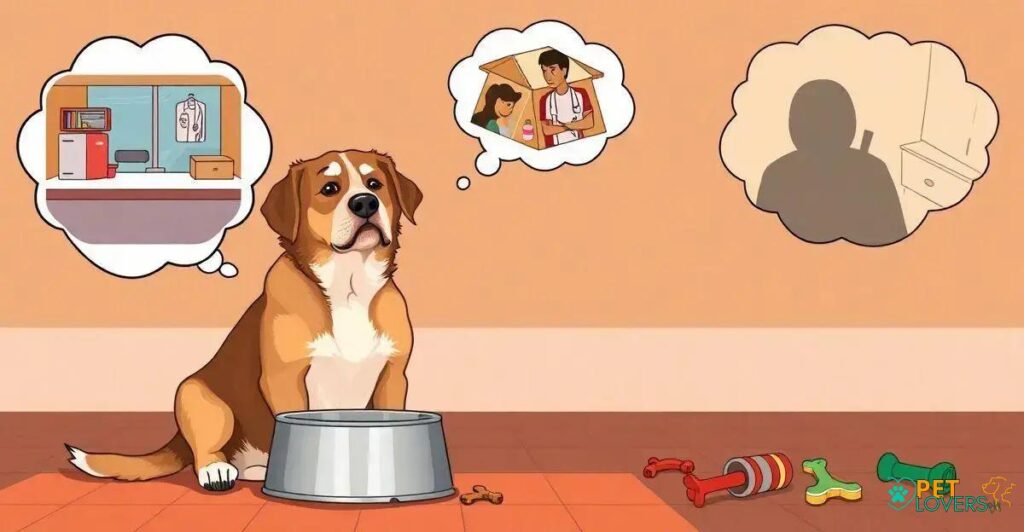Canine Appetite Loss: Causes, Identification, and Treatment
When a dog refuses to eat, it’s essential to identify the underlying cause. Common causes include underlying medical issues, environmental factors, psychological reasons, and behavioral changes. Consult with a veterinarian to rule out any underlying medical issues and develop a personalized plan to address your dog’s specific needs. Providing a stress-free and comfortable environment, addressing behavioral changes, and ensuring a consistent daily routine can help your dog regain their appetite.
Is your furry friend turning up their nose at mealtime? If your dog is refusing to eat, it’s not just a matter of pickiness.
There are several reasons behind canine appetite loss, and understanding the root cause is crucial in addressing the issue.
In this post, we’ll explore the shocking reasons why your dog might be refusing to eat and provide valuable insights on how to get them back to their usual mealtime routine.
Common Causes of Canine Appetite Loss
When a dog refuses to eat, it can be a cause for concern.
Common causes of canine appetite loss include food allergies, food sensitivities, and gastritis.
Additionally, changes in the dog’s environment, such as moving to a new home or changes in the owner’s work schedule, can also contribute to appetite loss.
Moreover, certain medications can cause loss of appetite in dogs.
Furthermore, dental problems, such as gum disease or tooth pain, can also lead to a decrease in appetite.
Lastly, changes in the dog’s social environment, such as the addition of a new pet or person in the household, can also cause stress and lead to appetite loss.
Underlying Medical Issues
Underlying Medical Issues are a common cause of canine appetite loss. Some potential medical issues that can lead to decreased appetite in dogs include gastrointestinal diseases, such as inflammatory bowel disease or gastrointestinal foreign bodies, as well as kidney disease, hepatitis, and pancreatitis. Additionally, dogs with arthritis or other chronic pain conditions may also experience a decrease in appetite. If your dog is experiencing a sudden onset of appetite loss, it is essential to consult with a veterinarian to rule out any underlying medical issues.
Environmental Factors
Environmental factors can also play a significant role in a dog’s refusal to eat. Changes in the dog’s environment, such as a new home or a change in the owner’s work schedule, can cause stress and lead to appetite loss.
Additionally, changes in the dog’s living situation, such as a move to a new house or apartment, can also cause stress and affect a dog’s appetite.
Furthermore, exposure to toxic substances, such as pesticides or cleaning products, can also cause a decrease in appetite.
Moreover, temperature fluctuations can also affect a dog’s appetite, especially in extreme temperatures.
It is essential to identify and address any environmental factors that may be contributing to your dog’s appetite loss.
Psychological Reasons
Psyological reasons can also contribute to a dog’s refusal to eat. Stress and anxiety, often caused by changes in the dog’s environment or social dynamics, can lead to appetite loss. Additionally, separation anxiety and
noise phobias
can also cause a decrease in appetite. Furthermore, dogs that are depressed or experiencing grief may also show a decrease in appetite. It is essential to identify and address any psychological factors that may be contributing to your dog’s appetite loss, as left untreated, it can lead to more serious health issues.
Behavioral Changes
Behavioral changes can also contribute to a dog’s refusal to eat. Changes in the dog’s daily routine, such as a change in feeding schedule or exercise routine, can cause stress and lead to appetite loss.
Additionally, learned behavior, where a dog associates mealtime with negative experiences, can also lead to a decrease in appetite.
Furthermore, dogs that are food picky or have food preferences may also show a decrease in appetite.
It is essential to identify and address any behavioral factors that may be contributing to your dog’s appetite loss, as left untreated, it can lead to more serious health issues.
Conclusion
When a dog refuses to eat, it’s essential to identify the underlying cause of the behavior. By considering the common causes of canine appetite loss, including underlying medical issues, environmental factors, psychological reasons, and behavioral changes, you can take a comprehensive approach to addressing the issue.
Remember to consult with a veterinarian to rule out any underlying medical issues and to develop a personalized plan to address your dog’s specific needs.
With patience, persistence, and the right guidance, you can help your dog regain their appetite and improve their overall health and well-being.
FAQ: Common Questions About Canine Appetite Loss
What are the most common causes of canine appetite loss?
The most common causes of canine appetite loss include underlying medical issues, environmental factors, psychological reasons, and behavioral changes.
How can I identify the underlying cause of my dog’s appetite loss?
Consult with a veterinarian to rule out any underlying medical issues, and consider the common causes of canine appetite loss to develop a personalized plan to address your dog’s specific needs.
What are some environmental factors that can contribute to canine appetite loss?
Environmental factors that can contribute to canine appetite loss include changes in the dog’s living situation, exposure to toxic substances, and temperature fluctuations.
Can psychological factors contribute to canine appetite loss?
Yes, psychological factors such as stress and anxiety, separation anxiety, and depression can contribute to canine appetite loss.
How can I address behavioral changes that may be contributing to my dog’s appetite loss?
Addressing behavioral changes may involve identifying and changing any learned behaviors, providing a consistent daily routine, and providing a stress-free environment.
What can I do to help my dog regain their appetite?
Consult with a veterinarian to develop a personalized plan to address your dog’s specific needs, and provide a stress-free and comfortable environment to help your dog regain their appetite.

